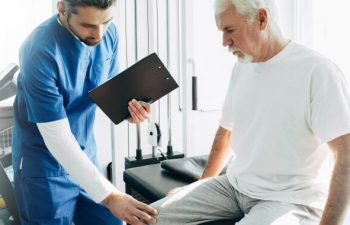
Knee pain is often blamed on osteoarthritis, aging or injury. It makes sense – knees are under a lot of stress every day and are one of the more common sites impacted by aging. Many people eventually seek out medical treatment, but often spend a long time living with discomfort. One of the most important reasons to have a painful knee examined by an orthopedic specialist is a condition called inflammatory arthritis. It differs from other types of knee pain, and it can be very destructive to your joints if not caught early.
What is Inflammatory Arthritis?
Inflammatory arthritis is a group of over 100 arthritic conditions caused by autoimmune disease. The most commonly recognized inflammatory arthritis types are rheumatoid arthritis and psoriatic arthritis. No matter which of the 100 different types you have, there is no cure, and it progresses at different speeds depending on the type. Despite the lack of cure, there are effective treatments to slow joint damage.
What Damage is Caused by Inflammatory Arthritis?
Autoimmune conditions that attack the joints erode the synovial membrane, removing the cushion your joints need to glide and turn. Without this lining, your joints swell, the cartilage and ligaments are damaged and bone begins to wear away. Your knees are prime targets for inflammatory arthritis and can break down quickly without treatment.
Symptoms of Inflammatory Arthritis
Many forms of inflammatory arthritis begin slowly, affecting only a single joint at the beginning. You may also have pain in multiple joints but attribute it to something else. The symptoms may also come and go, and when they do show up, you may not be able to connect them to any injury causing activity.
Other potential signs of inflammatory arthritis are:
- Stiff knees after resting for long periods
- Swollen knees that are difficult to straighten or bend
- Knee instability – weakness, buckling, locking, swaying left or right
- Creaking, popping or grinding
Treating Inflammatory Arthritis
Left untreated, inflammatory arthritis can destroy a joint, cause deformities and result in disability. It is critical to have your knee pain examined as soon as possible to find the cause. Autoimmune treatments work well to restore joint function and ward off future damage. Joint injections and other non-surgical options help restore mobility, and for severe cases, knee joint replacement offers tremendous relief.
If you are having knee pain of any kind, contact Robotic Joint Center today for an accurate diagnosis and cutting-edge treatment options.
Posted on behalf of
New York, NY 10021
Phone: (212) 308-3089
FAX: (646) 844-1396
Email: Info@RoboticJointCenter.com
Mon – Fri: 9 AM – 6 PM